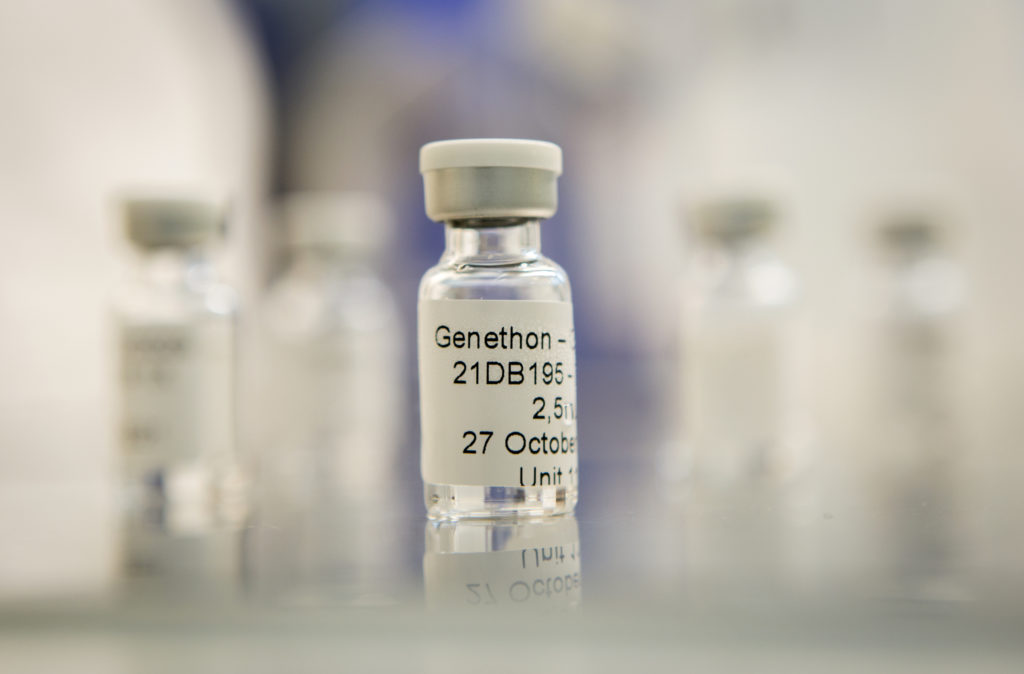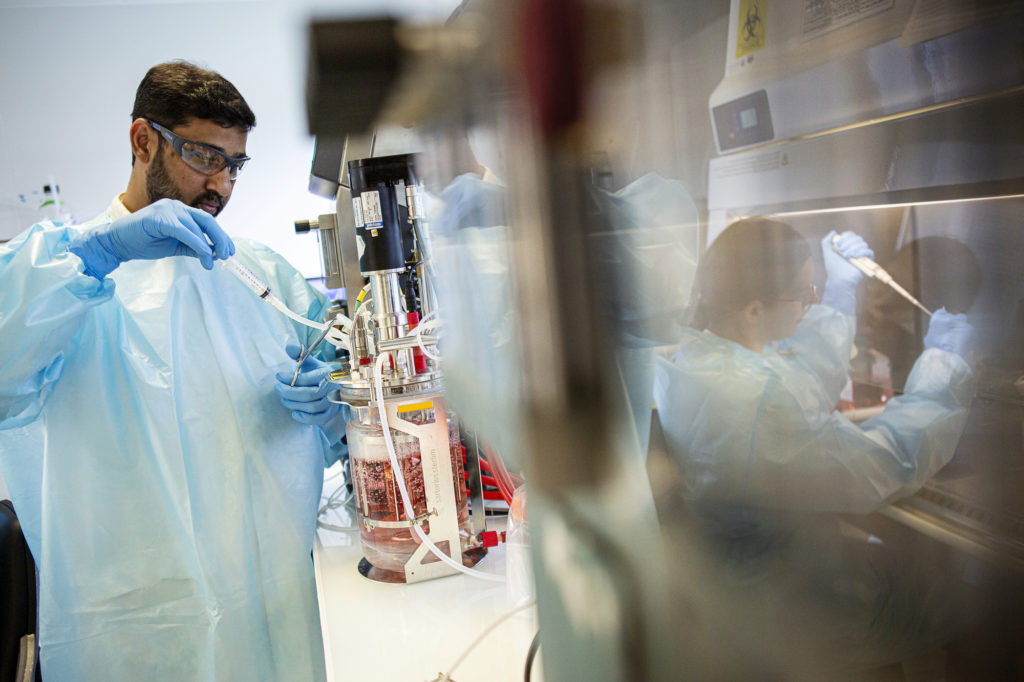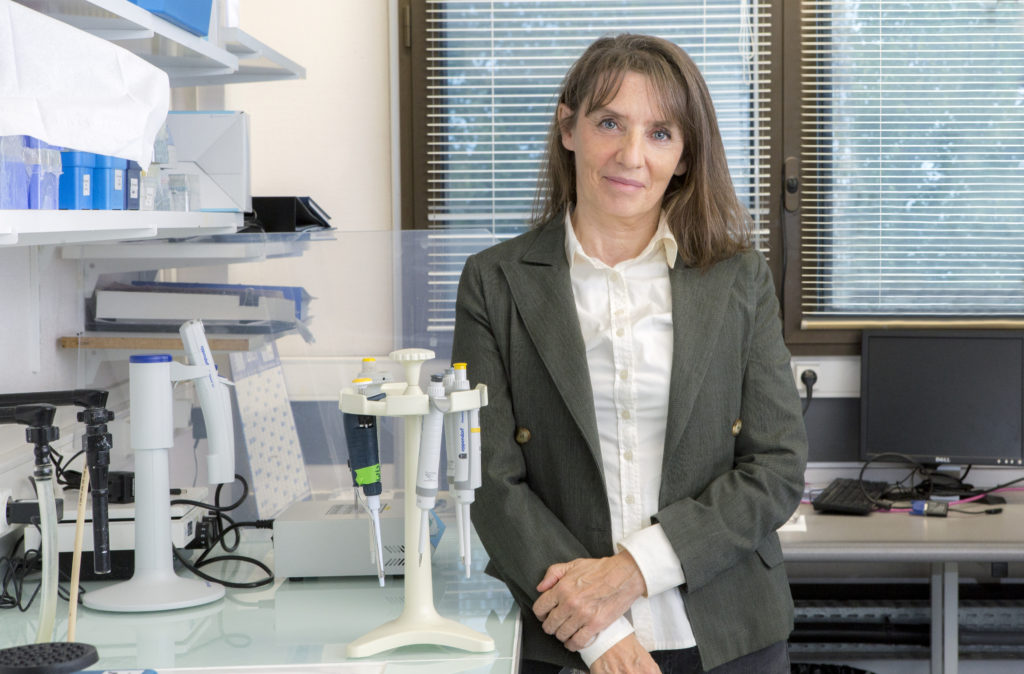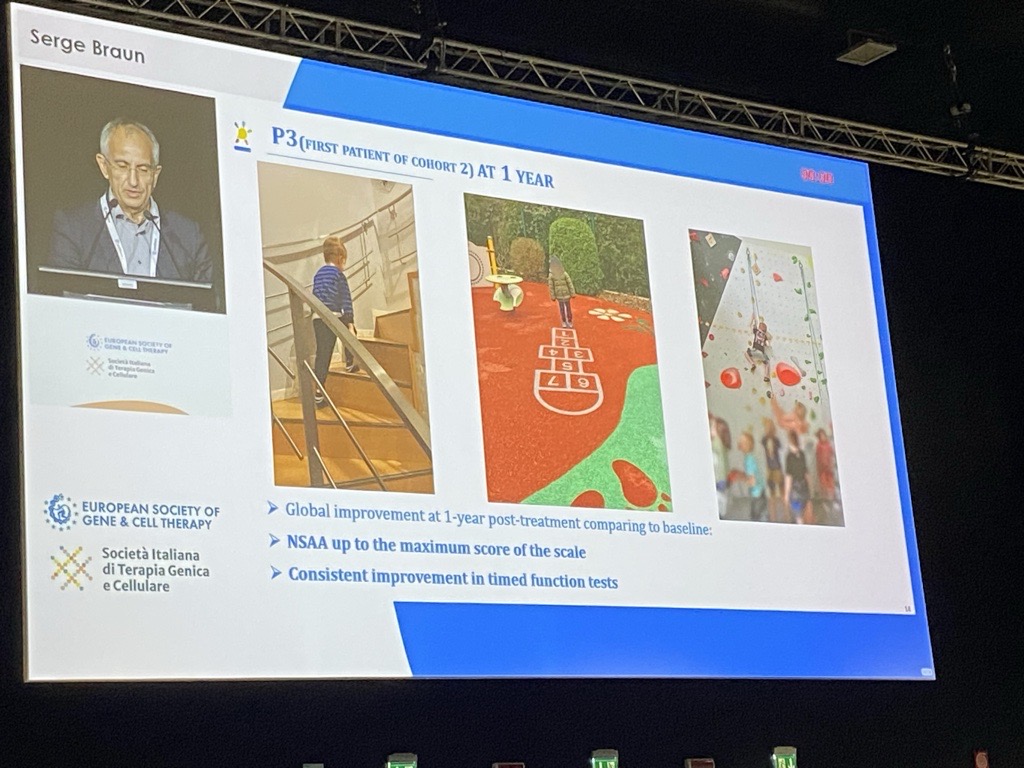Genethon newsletter – 2024 Issue Number 2
This last issue of 2024 year highlights several major clinical development and scientific milestones over the past several months for Genethon.
– Positive safety and efficacy results for the gene therapy GNT0004, set it apart from all other Duchenne Muscular Dystrophy treatments.
– Launching of a Phase 2 trial of imlifidase as a pre-treatment to GNT-0003 in severe Crigler-Najjar syndrome, in collaboration with Hansa Biopharma.
– Major achievement with the article in Nature Communications describing an innovative methodology using of AI to design a new generation of capsids for gene therapy vectors for muscle diseases.
CEO Commentary
Genethon’s GNT0004 Gene Therapy for Duchenne Muscular Dystrophy Unlike Any Other DMD Gene Therapies on the Market and in Development

In a podcast and video coinciding with release of new data from Genethon’s all-in-one Phase 1/2/3 trial of gene therapy (GNT0004) for Duchenne Muscular Dystrophy (DMD), CEO Frederic Revah discusses the unique elements distinguishing GNT0004 from other DMD gene therapies and explains why the Phase 3 ready GNT0004 has the potential to be the best-in-class gene therapy for overturning this deadly disease.
One of the most significant distinguishing elements, Dr. Revah explains, is the dose of microdystrophin (a shortened version of the dystrophin gene). It is much lower than the dose used by other products, making it less expensive to manufacture amongst other potential advantages; and it demonstrated preliminary efficacy in the Phase 1/2 portion of the all-in-one study. The results enable Genethon to proceed with Phase 3 pivotal trials in Europe, followed by the US.
Listen to Dr. Revah’s discussion of GNT0004 on the Global Genes podcast, RARECast: A Non-Profit Works to Advance a DMD Gene Therapy.
In a video, titled “GNT0004, a gene therapy that can overturn Duchenne muscular dystrophy”, Dr. Revah discusses Genethon’s pioneering history of gene therapy for rare diseases and details the Phase 1/2 data that supports the DMD pivotal study, including a video showing the remarkable recovery of one patient.
Product development
Genethon Expects to Begin Phase 3 Trials of Gene Therapy (GNT0004) for Duchenne Muscular Dystrophy in 2025 in Europe, Followed by US

Based on positive results of the Phase 1/2 dose escalation portion of an all-in-one Phase 1/2/3 trial of GNT0004 for Duchenne muscular dystrophy, Genethon expects to begin Phase 3 pivotal trials in the second quarter of 2025 in Europe followed by the US.
The results of the international multicenter study were presented by Serge Braun, PhD, Genethon’s Director of Neuromuscular Strategy, at the ASGCT Breakthroughs in Muscular Dystrophy Nov. 19-20 in Chicago.
The Phase 1/2 part of the all-in-one trial was completed at the end of October and determined the therapeutic dose of GNT0004 to be used in the pivotal study. For all the patients treated at the effective dose, the results demonstrated, one to two years after treatment, stabilization of motor functions measured by a 34-point clinical evaluation seale. For one patient, an improvement was observed, reaching the maximum score of 34 at 12 months, and confirmed at 18 months post-treatment.
See the video of the patient’s improvement.
This development was remarkable compared with that of untreated patients in Genethon’s parallel natural history study, for whom mean motor function declined rapidly over the same period. After review and advice from the independent monitoring committee, these conclusive results enable Genethon to launch the Phase 3 confirmatory part of the all-in-one trial with the inclusion of the first patients in mid-2025.
Genethon and Hansa Biopharma Initiate a Phase 2 Trial of lmlifidase as a Pre-Treatment to GNT0003 for Severe Crigler-Najjar Syndrome
Sweden-based Hansa Biopharma, a pioneer in enzyme technology for rare immunological conditions, and Genethon launched the Phase 2 trial to evaluate Hansa’s imlifidase in offsetting the presence of pre-existing anti-AAV antibodies in Crigler-Najjar syndrome patients.
Antibodies against AAV vectors are a major challenge, preventing patients from being treated with potentially curative gene therapies. The trial will evaluate in Crigler-Najjar patients with pre-existing antibodies against AAV8, the efficacy and safety of a single intravenous administration of Genethon’s GNT0003 gene therapy following pre-treatment with imlifidase, a first-in-class immunoglobulin G (lgG) antibody cleaving enzyme therapy. Genethon and Hansa expect to communicate data from the trial in 2025.
GNT0003 is currently being evaluated in a pivotal clinical trial for Crigler-Najjar syndrome following positive results of the phase 1/2 dose escalation study. If successful, GNT0003 would be the first gene therapy treatment for Crigler-Najjar syndrome. The Phase 2 trial with imlifidase is an attempt to expand access to GNT0003 to more patients.
The Dion Foundation and Atamyo Therapeutics to Expand into the US Atamyo’s Clinical Trial of ATA-200 Gene Therapy for Limb-Girdle Muscular Dystrophy Type 2C/R5
Atamyo Therapeutics, a spin-off of Genethon, and the US-based Dion Foundation for Children with Rare Diseases entered a partnership to expand into the US a first-in-human clinical trial of ATA-200, Atamyo’s gene therapy for the treatment of the y-sarcoglycan related limb-girdle muscular dystrophy Type 2C/R5 (LGMD2C/R5).
The Dion Foundation will finance deployment in the US of Atamyo’s clinical trial of ATA-200 (NCT05973630). The study, sponsored by Atamyo, has already received regulatory clearance in France and Italy. This multicenter, Phase 1b, open-label, dose escalation study will evaluate safety, pharmacodynamics, efficacy, and immunogenicity in children of intravenous ATA-200, a single-dose Adeno-Associated Virus (AAV) vector carrying the human y-sarcoglycan transgene.
Atamyo announced in November that the U.S. Food & Drug Administration (FDA) has cleared its lnvestigational New Drug (IND) application for ATA-200 to proceed in a Phase 1b/2b clinical trial. The company expects to open the first US center by the end of 2024.
Research Collaborations
Genethon and Samabriva Strengthen Their Partnership to Develop a Cost-Effective Plant-Based AAV Manufacturing Process

Genethon and Samabriva, a plant-based biotechnology company using a proprietary bioproduction platform for biopharmaceuticals, announced continuation of their collaboration to complete development of a new way of producing AAVs with funding of 1.4M Euros from France’s Health Innovation 2030 plan.
The partnership is developing a competitive process for producing AAVs (the adeno-associated viral vectors that deliver gene therapies) using a plant-based viral vector expression system. Current manufacturing methods for AAV vectors are not sufficient to supply, at an affordable cost, the quantities needed to treat diseases. The goal is to ensure patient access to AAV gene therapy by increasing yields and significantly reducing bioproduction costs; ultimately decreasing the cost of these treatments.
“It has been six years since the start of the partnership with Samabriva,” said Patrick Santambien, Director of Technological Development at Genethon. “Genethon and Samabriva are more committed than ever to the acceleration phase towards the industrialization of this disruptive AAV vector production process”
Scientific Publications
Nature Communication Article Describes a Next-Generation Gene Therapy Vector for Muscle Diseases Using Al Predictive Methodology

The article titled “An engineered AAV targeting integrin alpha V beta 6 presents improved myotropism across species” describes how Isabelle Richard, Ph.D.,and her Progressive Muscular Dystrophies Team at Genethon perfected an innovative methodology based on artificial intelligence (AI) to design a new generation of capsids for developing a more effective gene therapy vector for muscle diseases.
The new capsids effectively target the muscle and avoid the liver, while reducing the doses of vectors required. These results pave the way for more effective gene therapies for neuromuscular diseases, while reducing the risk of side-effects and production costs.
“The era of gene therapy for neuromuscular diseases has begun, and the complexity of these diseases requires us to constantly innovate to improve drug candidates targeting muscle,” observed Dr. Richard. “The new generation of gene therapy vectors we have designed is a game-changer in terms of efficacy and safety. It is currently being tested for various neuromuscular diseases.”
20 Genethon Researchers and Collaborators Showcase the Latest Advances in Gene Therapies for Multiple Diseases at the ESGCT 31st Annual Congress October 22-25 in Rome

Genethon CEO Frederic Revah observed, “Participating in the ESGCT congress is a unique opportunity for our teams to share the latest results of Genethon’s work in the field of gene therapy, scientific and medical advances that can change patients” lives.
“The selected oral presentations and posters” he added, “reflect not only the expertise of our teams, but also Genethon’s pioneering role and recognized leadership in this sector.”

